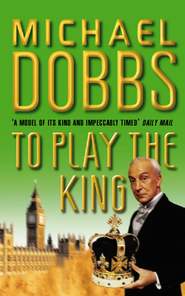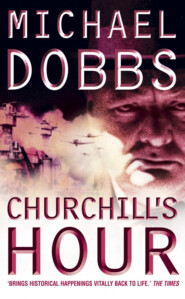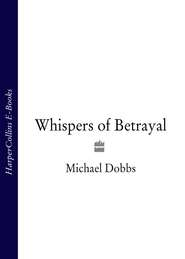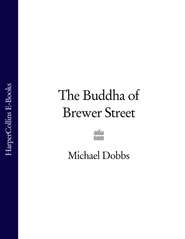По всем вопросам обращайтесь на: info@litportal.ru
(©) 2003-2025.
✖
The Final Cut
Автор
Год написания книги
2019
Настройки чтения
Размер шрифта
Высота строк
Поля
‘My life would be so empty and graceless without you,’ he smiled, and meant it. ‘Well, time to give the ashes a rake and discover whether the embers still glow.’ He kissed her and rose, drawn again to the view from the window.
‘What is out there?’ she demanded.
‘Nothing. As yet. But soon there may be. You know the Thatcher Society wants to erect a statue to the Baroness on that piece of lawn right out there.’ He prodded a finger in the direction of the carefully manicured grass that lay beyond the wall of the Downing Street garden, opposite St James’s Park. ‘You know, this is a view that hasn’t much changed in two hundred and fifty years; there’s a print hanging in the Cabinet Room and it’s all there, same bricks, same doors, even the stones on the patio are original. Now they want to put up a bloody statue.’
He shook his head in disbelief. ‘And the erection fund is almost fully subscribed.’ He turned sharply, his face twisted by frustration. ‘Mortima, if the first thing I’m going to see every morning of my life when I draw my bedroom curtains is that bloody woman, I think I shall expire.’
‘Then stop it, Francis.’
‘But how?’
‘She doesn’t merit a statue. Thrown out of office, betrayed by her own Cabinet. Is the statue going to show all those knives in her back?’
‘Yet almost all of them are hacked from office, my love. By their colleagues or the electorate. Like Caesar, taken from behind by events they hadn’t foreseen. Ambition makes leaders blind and lesser men bloody; none of them knew when the time had come to go.’
‘There’s only one Prime Minister who should have a statue there, and that’s you!’
He chuckled at her commitment. ‘Perhaps you’re right – but flesh and blood turn to stone all too soon. Don’t let’s rush it.’
He turned himself to stone two hours later, as fixedly as if he had spent the night wrapped in the arms of the Medusa. It was his press secretary’s habit to arrange on a regular basis a meeting with representatives of charities – ordinary members, not experienced leaders – inviting them to the doorstep of Number Ten but not beyond, a visit too brief to allow for any substantial lobbying but long enough to show to the cameras that the Prime Minister cared – the ‘Click Trick’, as the press secretary, a hockey player and enthusiast named Drabble, termed it. Having been at his desk since six collating the morning’s press, extracting from it selected articles he thought worthy of note and preparing a written summary, he met Urquhart in the entrance hall shortly before nine thirty.
‘What is it today, Drabble?’ Urquhart enquired, striding briskly down the red-carpeted corridor from the Cabinet Room.
‘A birthday surprise, Prime Minister. This week it’s pensioners, they’re going to make a presentation.’
Somewhere inside, Urquhart felt part of his breakfast liquefying. ‘Was I told of this?’
‘You had a note in your box last weekend, Prime Minister.’
‘Sadly, kept from me by more pressing letters of state,’ Urquhart equivocated. Damn it, Drabble’s notes were so tedious, and if a Prime Minister couldn’t rely on professionals to sort out the details…
The great door swung open and Urquhart stepped into the light, blinked, smiled and raised a hand to greet the onlookers as though the street were filled with a cheering crowd rather than a minor pack of world-weary journalists huddled across the street. A group of fifteen pensioners drawn from different parts of the country were gathered round him, arranged by Drabble, who was giving an advanced simulation of a mother hen. The mechanics were always the same: Urquhart asked their names, listened with serious-smiling face, nodded sympathetically before passing on to the next. Soon they would be whisked off by one of Drabble’s staff and a junior Minister from an appropriate department to be plied with instant coffee and understanding in a suitably impressive Whitehall setting. A week later they would receive a photograph of themselves shaking hands with the Prime Minister and a typed note bearing what appeared to be his signature thanking them for taking the trouble to visit. Their local newspapers would be sent copies. Occasionally, the discussions raised points or individual cases which were of interest to the system; almost invariably the majority of those involved went back to their pubs and clubs to spread stories of goodwill. A minor skirmish in the great war to win the hearts and votes of the people, but a useful one. Usually.
On this occasion, Urquhart had all but completed the ritual of greeting, moving on to the last member of the group. A large package almost five foot in height was leaning against the railings behind him and, as Urquhart swung towards him, so the pensioner shuffled the package to the fore. It turned out to be a huge envelope, addressed simply: TO THE PRIME MINISTER.
‘Many happy returns, Mr Urquhart,’ the pensioner warbled.
Urquhart turned round to look for Drabble, but the press officer was across the street priming the cameramen. Urquhart was on his own.
‘Aren’t you going to open it then?’ another pensioner enquired.
To Urquhart’s mind the flap came away all too easily, the card slipped out in front of him.
WE ARE FOR YOU, FU was emblazoned in large red letters across the top. Across the bottom: 65 TODAY!
The group of pensioners applauded, while one who was no taller than the card itself opened it to reveal the message inside.
WELCOME TO THE PENSIONERS’ CLUB, it stated in gaudy handscript. OAP POWER! The whole thing was decorated with crossed walking sticks.
Urquhart’s eyes glazed like marble. Rarely had the photographers seen the Prime Minister’s smile so wide, yet so unmoving, as if a chisel had been taken to hack the feature across his face. The expression lingered as he was drawn across the street, more to lay his hands upon the wretched Drabble than to go through the ritual of bantering with the press.
A chorus of ‘Happy Birthday’ mingled with shouts of ‘Any retirement announcement yet, Francis?’ and ‘Will you be drawing your pension?’ He nodded and shook his head in turn. The mood was jovial and Drabble enthusiastic; the fool had no idea what he’d done.
‘Are you too old for such a demanding job at sixty-five?’ one pinched-faced woman enquired, thrusting a tape recorder at him.
‘Churchill didn’t seem to think so. He was sixty-five when he started.’
‘The American President is only forty-three,’ another voice emerged from the scrum.
‘China’s is over ninety.’
‘So, no discussions about retirement yet?’
‘Not this week, my diary is simply too full.’
Their slings and arrows were resisted with apparent good humour; he even managed to produce a chuckle to indicate that he remained unpricked. Politics is perhaps the unkindest, least charitable form of ritualized abuse allowed within the law; the trick is to pretend it doesn’t hurt.
‘So, what do you think of today’s poll?’ It was Dicky Withers of the Daily Telegraph, an experienced hand known for concealing an acute instinct behind a deceptively friendly pint of draught Guinness.
‘The poll.’
‘Yes, the one we carried today.’
Drabble began an unscheduled jig, bouncing from foot to foot as though testing hot coals. He hadn’t included the poll in his digest, or the intemperate editorial in the Mirror entitled IT’S TIME TO GO. Christ, it was the man’s birthday, one day of the year to celebrate, to relax a little. And it wasn’t that Drabble was an inveterate yes-man, simply that he found it easier to accept the arguments in favour of circumspection, – all too frequently messengers who hurried to bring bad news from the battlefield were accused of desertion and shot.
‘Forty-three per cent of your own party supporters think you should retire before the next election,’ Withers elaborated.
‘Which means a substantial majority insisting that I stay on.’
‘And the most popular man to succeed you is Tom Makepeace. Would you like him to, when the time comes?’
‘My dear Dicky, when that time comes I’m sure that Tom will fight it out with many other hopefuls, including the bus driver.’
Makepeace = bus driver, Withers scribbled, noting the uncomplimentary equivalence. ‘So you intend to go on, and on, and on?’
‘You might say that,’ Urquhart began, ‘but I wish you wouldn’t. I’m enjoying a good innings and, though I’m not greedy for power, so long as I have my wits and my teeth and can be of service…’
‘What do you intend to do when eventually you retire, Mr Urquhart?’ Pinch Face was thrusting at him again.
‘Do?’ The creases of forced bonhomie turned to a rivulet of uncertainty. ‘Do? Do? Why, be anguished and morose like the rest of them, I suppose. Now, you’ll excuse me, ladies and gentlemen. I have a Cabinet meeting to attend.’
He turned and embarked upon what he hoped was a dignified retreat back across the street – like a lion regaining his den, Drabble decided, tail thrashing ominously. He declined to follow.
Urquhart brushed into his wife as she was emerging from the lift to their private apartment. ‘Everything went well?’ she enquired before she had noticed his eyes.
‘They say it’s time for a change, Mortima,’ he spat, grinding his teeth. ‘So I’m going to give ’em change. Starting with that bloody fool of a press secretary.’
‘Astonishing,’ Urquhart thought to himself as the Cabinet filed in around the great table, ‘how politicians come to resemble their constituencies.’











